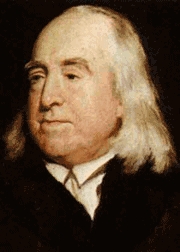On this date in 1748, Jeremy Bentham was born in London. The great philosopher, utilitarian, humanitarian and atheist began learning Latin at age 4. He earned his B.A. from Oxford by age 15 or 16 and his M.A. at 18. His Rationale of Punishments and Rewards was published in 1775, followed by his groundbreaking utilitarian work Introduction to the Principles of Morals and Legislation. Bentham propounded his principle of “the greatest happiness of the greatest number.” He worked for political, legal, prison and educational reform.
Inheriting a large fortune from his father in 1792, Bentham was free to spend his remaining life promoting progressive causes. The renowned humanitarian was made a citizen of France by the National Assembly in Paris. In published and unpublished treatises, Bentham extensively critiqued religion, the catechism, the use of religious oaths and the bible. Using the pen name Philip Beauchamp, he co-wrote a freethought treatise, Analysis of the Influence of Natural Religion on the Temporal Happiness of Mankind (1822). D. 1832.

